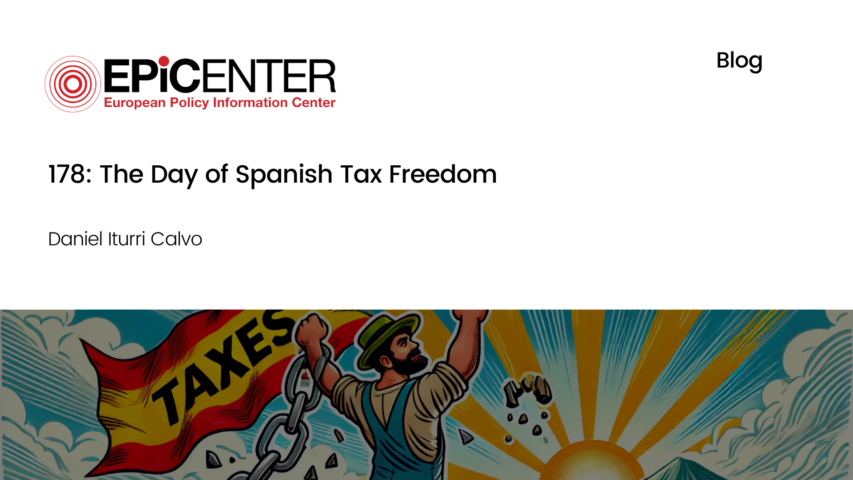178: The Day of Spanish Tax Freedom

178: The Day of Spanish Tax Freedom
Daniel Iturri Calvo // 27 June 2019
178. That is the number of days a Spanish worker has to wait until they actually begin to make any money for themselves. This number was unveiled by EPICENTER’s Spanish member think tank, Civismo, who released their annual report on June 27th celebrating Tax Freedom Day. Starting on June 28th, Spaniards will no longer be working for the state, but rather for themselves. The report attempts to answer several questions regarding Spanish fiscal policy, such as how much Spaniards pay in taxes in their lifetime, and what is the economic value of the public services they receive.
As background, Civismo notes that Spanish tax and fiscal policy has seen 3 major reforms in recent years: 2009, 2011, and 2015. The first two increased the tax burden on incomes, but the last one gave citizens a small break. Tax collection trends have remained very similar across the different types of taxes, be it Personal Income Tax (PIT) or Value Added Tax (VAT). Taxable amounts peaked before the recession, and have slowly returned to pre-crisis levels, while the amount the state collects has now nearly reached a historic maximum. Now that Spain’s economy is beginning a new era and the political scene is undergoing a serious transition, Civismo underscores the importance of understanding the current state of taxes and their burden on lifestyle and employment.
When analyzing the specifics of how many days one spends working to pay the different types of taxes, Civismo found that Social Security contributions were the biggest burden on workers. These account for 103 days of wages. This is a slight increase compared to last year’s 102 days, and is due to the historic 22% increase in minimum wage (from 736 € to 900 € per month). A smaller 34 days are needed to pay for the PIT, decreasing by a day compared to last year. This is thanks to actions taken by the Central Administration and Autonomous Communities in order to offset the increase caused by the minimum wage raise. The rest of the taxes have remained the same: Spaniards need 25 days to pay for VAT, 11 for Special Taxes such as those on electricity, and 5 days for “other taxes” which include wealth and inheritance taxes.
Looking more specifically into how many days each age bracket works to pay for taxes, Civismo found that there are striking differences between the groups. The ones who will have to work the least number of days are those 65 and older, whose Freedom Tax Day fell on May 16th. Their ‘tax wedge’ – meaning the sum of PIT and Social Security taxes, or rather what the employee doesn’t get to receive from their wage – amounted to a relatively small 12.03% because of the absence of pressure from Social Security contributions. The youngest workers (aged 16 to 29) had their Tax Freedom Day on June 13, having a tax wedge of 33.45%, lower than last year’s 35.89%. On the other hand, this number increases to 37.50% and 38.84% for workers aged 30 to 44 years old and 45 to 64 years old respectively. These numbers push back their Tax Freedom Days to 2nd and 4th of July respectively.
Days Spent Paying Taxes
The dates for workers’ Tax Freedom Day also differs depending on which autonomous community they live in. For example, those working in Catalonia pay taxes for the most number of days, having their Tax Freedom Day on July 5th. In contrast, those working in the Autonomous Community of Madrid only have to wait until June 28th. Moreover, Civismo also analysed differences between the OECD countries and found that Spain has a higher tax wedge by 3.3 percentage points compared to all other OECD countries. Although this number has fallen by 1.4 percentage points to 39.4%, only 15 of the 34 OECD member states have higher tax wedges.
Lastly, after looking at how much Spaniards pay in taxes, Civismo evaluates how much taxpayers actually receive from the system. In Spain, they found, the weight of welfare spending as a part of GDP is one of the highest in the Eurozone. Within that, pensions account for the biggest chunk of spending, amounting to 120 billion euros per annum and increasing at a pace of 3% due to ageing and longevity. The group that receives these benefits – those aged 65 and over – are released from their tax burdens the soonest and receive the most compared to any other group: “the economic value of what [Spaniards receive] for this concept (social protection, health, education, safety, investment …) is more than tripled during retirement, going from the nominal 6,934.42 euros from 16 to 29 years to 22,388.80 from 65 onwards”. Therefore, out of any group, the elderly benefit the most under Spain’s fiscal system.
Civismo concludes by calling attention to the “taxes in disguise”, such as inflation and public debt. Public debt alone, for example, would push back Tax Freedom Day by 101 days to October 6th. Taking this into consideration, Civismo argues that future fiscal policy in Spain must “increase competitiveness and productiveness of the Spanish economy” so as to “relieve fiscal pressures during a worker’s lifetime”. Otherwise, a country with such a high economic burden on its workers is likely to struggle in the face of a future economic challenges.
EPICENTER publications and contributions from our member think tanks are designed to promote the discussion of economic issues and the role of markets in solving economic and social problems. As with all EPICENTER publications, the views expressed here are those of the author and not EPICENTER or its member think tanks (which have no corporate view).




